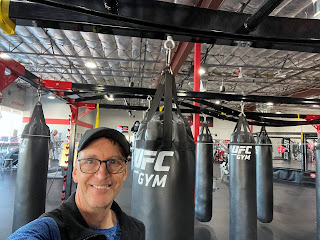Dick Collins Firetrails 50 Miler race report.
Photo credit: Esther Searcy (@esthersearcyphoto).
It was my first 50
miler and I was in the restroom when the race started. I was one minute behind
the pack and because of the distance, I was okay with it. I was feeling strong,
I ran at a steady pace (no walking) while it was cooler, after clearing the initial
single-track congestion.
After the aid station at the halfway point (out and back),
my glutes and legs were feeling heavy, so I started walking and running from
that point on. At mile 36, my self-talk was about keeping my feet moving and
finishing my first 50 miler. Mentally I was in a good place because I was
confident that if I kept my legs moving, I would be able to finish.
After 40 miles the toughest sections of the course were the downhills.
My right leg below the quad felt weaker than my left, so I paid close attention
to my stride mechanics from that point on. It got hot from mile 30. I was using
evaporative cooling techniques at each aid station by pouring ice in my mission
neck gaiter, which has elastic on both ends so the ice did not fall out. I also
would grab ice out of the gator after I left the aid station for my bottles. I took
s-caps and salt stick fastchews hour until I ran out with about 5 miles. I used
one bottle of water the whole way. I used the black cup they gave us, for the
first 20 miles (until I left it at an aid station in error) for coke. In the
beginning, I was filling my second bottle with scratch. All my aid station
stops were short because I didn’t want my muscles to tighten. I was grabbing cut-up
cliff bars, donut holes (favorite), watermelon, bananas, and cantaloupe. I
shoved food in my pockets and kept moving. I also ended up eating 3 gu’s (aid
stations), and 3 cliff bar shot tubes (my pack).
After mile 20 one bottle I used for coke, and the other for
water. Except for the second to last aid station, I filled my second bottle
with scratch electrolyte, because there were no s-caps available in my pack or at
the aid station.
The last five miles were tough, because my walk/run stride
was more like a hobble. The last 2 ½ miles were most difficult because it
turned dark and it was a technical single track, mostly downhill. The uphills
were by far the easiest, so I was looking forward to the ups until the end.
Finally, the finish line was visible. I finished alone and
immediately was grateful I was able to accomplish this goal. Special thanks to
my friend and training partner Anthony Olivero. Anthony ran the marathon and
was at the finish to greet me and help me recover.
Anthony and I had previously discussed that this was a
business trip, and we both took care of business! We were happy and excited about
our next race adventure.

